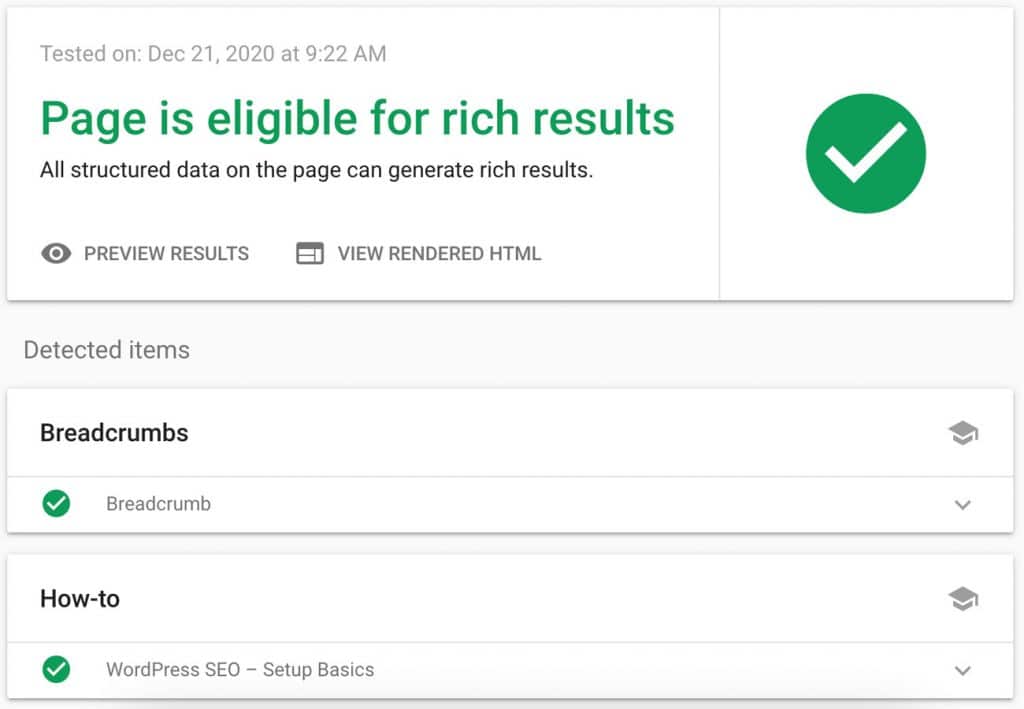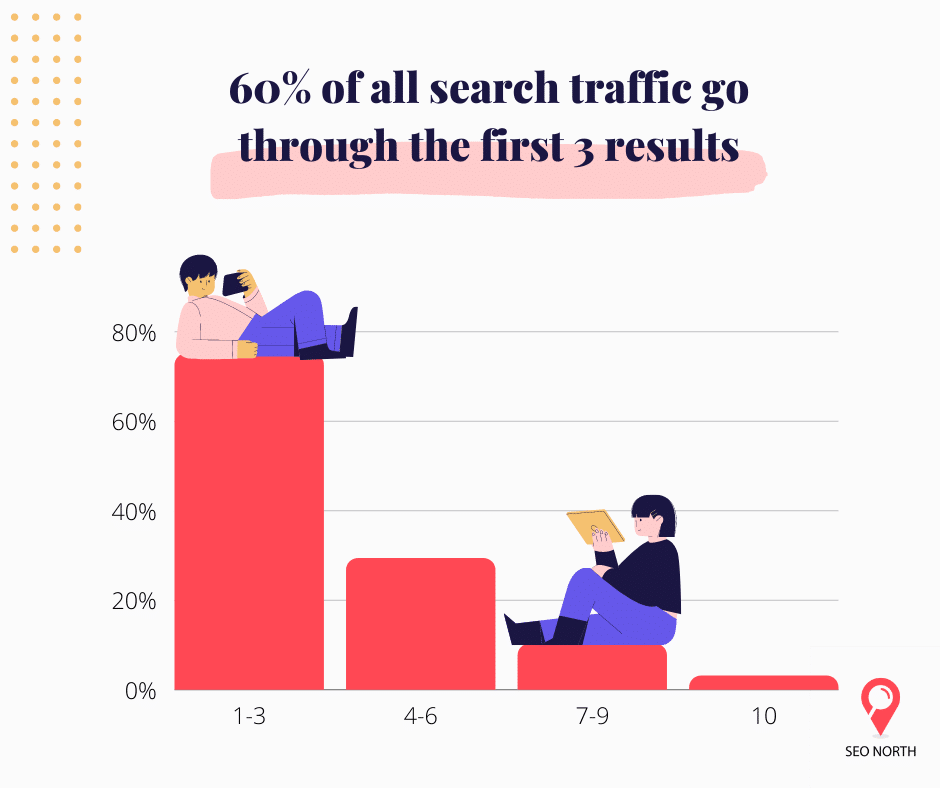Your business is missing out on the SEO benefits of structured data.

Structured data can help your site rank higher in search results and increase engagement with users. Keyword research, external link building, site speed optimization, and consistently publishing new content are great ways to boost your site’s search rankings.
With our expertise, we’ll make sure you’re set up for success so that your customers can find you when they need you most. We offer to consult services as well as implementation assistance if required.
Schema Services is a part of the Fully Managed SEO Package.
Table of Contents
Learn more about Schema
Schema markup (also known as structured data) is an essential skill set to improve your website’s technical SEO. It helps Google and other search engines better understand the content on your website.

Structuring your data is the best way to stand out on search engine results web pages. Because only 30 percent of websites implement this markup, there’s a good chance your competition hasn’t done it yet. That’s just one reason to get started today.
A Brief History of Markup
Google, Yahoo, Bing, and Yandex came together in 2011 and collectively created schema markup. Its purpose is to provide information more clearly to each search engine to understand the content better. In turn, rich snippets now contain more accurate data for search users to read.
Plus, Google rewards you for it.
Difference Between Markup and Structured Data
Though many use the two terms interchangeably, schema markup and structured data are not entirely analogous:
- Structured data refers to any HTML code that hints to search engines what the page contains, including publisher entity information
- Markup is structured data with standardized classes and values
- Google, Bing, Yahoo, and Yandex jointly developed the standardized vocabulary that markup uses
Markup combats a prevalent structured data problem in which search engines, web admins, and other platforms all use their word bodies and duplicate classes in their code. With a standard vocabulary, everyone uses the same error-resistant formatting.
Will Markup Improve Your SERPs?
There is no direct evidence providing that microdata raises organic Google search result rankings.

However, using rich snippets improves SERP visibility, which translates to a higher click-through rate. After all, fewer than one-third of search results use schema-validated rich snippets.
Few things in SEO can gain you a quick advantage like this can.
Why schema markup is so important
Simply put, structuring your data can:
- Improve crawlers’ ability to read your site: Markup unambiguously tells the search engines what’s on your page. This process matters especially to local businesses that need to clarify information like a contact number or what they’re selling.
- Improve visibility on search engine results pages: Markup adds more information to your results, making them engaging and attractive to users. It indirectly boosts your SEO because users often prefer a well-formatted result. Not only that, you’re helping search engines understand what types of services your business specializes in, more clicks lead to higher rankings.
- Improve user experience: With more information available at their fingertips, your clients can make more informed decisions, increasing your qualified traffic.
Why you need schema markup
Properly-formatted markup helps search engines understand your website. It helps with:
- Content recognition: Recognition is enough of a reason to consider structuring your data. The process helps your website become more informative and engaging, and few things can beat that in the SEO game.
- Brand awareness: If you want search engines to be aware of your brand, then formatting your content is a great way to achieve it. Plus, seeing your brand pop up in a well-formatted rich snippet builds trust among search users.
- Local business details: If your business is local, you want search engines to know how to display your address and other contact information. Structured data can achieve this task.
- Event promotion: You can use markup to promote events. Your website could pop up when local users search for tags like “events near me.”
- Visibility: Finally, you can display other details related to your business, such as a logo and the CEO’s name.
Types of Schema Markup
At first glance, the code may seem complicated, but it’s not the wrong place for a beginner to start. Schema.org(Canonical URL: https://schema.org) provides a list of the most common types of schema markup.
There are several ways to use schema markup vocabulary, including RDFa, Microdata, and JSON-LD. Google supports all three of these, though it prefers JSON-LD. It may be easier to use a plugin.
Resource Description Framework in Attributes (RDFa)
RDFa is an early iteration of the framework developed to establish in your HTML code. It was initially a rather complicated system, but revisions over time have improved ease of use. These days, many publishers still implement RDFa.
Some attributes that RDFa uses include:
- about — to inform the resource what the content is about
- content — to override the element’s content when you are using the property attribute
- datatype — to inform the resource what datatype of text is used when using the property attribute
- rel and rev — to specify the nature of a relationship with another resource
- resource, src, and href — to specify another resource
- typeof — to explain the RDF type of resource
Microdata
Microdata was once the favored choice over RDFa due to the latter’s complexity. However, the two frameworks share several elements.
For example, you can use Microdata throughout the HTML body, just like RDFa, but it’s usually just within the body tag. Some of its attributes include:
- itemid — to assign a unique identifier to the subject
- itemprop — to indicate that the tag has a property value
- itemref — to reference an element’s properties not otherwise contained within itemscope. It returns a list of element ids that have additional properties somewhere else.
- itemscope — to create an item and note information about it
Javascript Object Notation for Linked Objects (JSON-LD)
JSON-LD implements schema into either the body or head tags of a document. It uses the @type and @context attributes to specify the appropriate vocabulary.
Each publisher has its preference and reasons for choosing its format, but many opt for JSON because Google prefers its more straightforward construction than other frameworks.

Common Use Cases
Structured data can mark all kinds of items like recipes, event tickets, online courses, and physical products. Most often, publishers use markup to provide additional context to things like:
- People
- Places
- Creative works
- Products
- Organizations
Each class of data uses different properties depending on the type of item. For example, if you wanted to provide more detail about a “book,” a “creative work,” you could add the book’s title, ISBN, author’s name, and other data.
Other everyday use cases include:
- Blogs: If you write a blog, you can use schema to inform Google about your logo, the website’s name, and other data about the posts and other articles.
- E-Commerce: You can also use markup to clarify a product’s price, name, and reviews.
- Local business: There is also a localbusiness schema with several properties available.
There are two ways to incorporate schema into your website: You can either do the work yourself or hire a professional to take the burden off your hands.
Find Out More at SEO North
Though adding schema markup isn’t a guaranteed magic pill that ensures your site performs better, it does make it much easier for Google and others to understand what your content is about.
At SEO North, we understand there are more important things for you to deal with. We can help you achieve accurate results while focusing on the things that matter — running your business. Keep your business moving forward faster while reaping the benefits that our experts have to offer.
Published on: 2020-10-14
Updated on: 2024-06-24